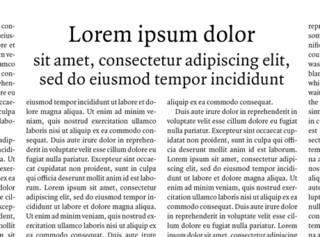Translating Lorem Ipsum
Nick Richardson
Sometimes, when we’re putting together an issue of the LRB, we use Lorem Ipsum, a chunk of phoney Latin dummy text that’s been used by printers and typesetters since the 16th century. We paste it into a layout so we can tell what a page will look like before the copy's ready. The practice is known as ‘greeking’ because the Latin’s so mixed up it’s all Greek.
Only it isn't. The text itself has been designed not to communicate, to have the look of text but no meaning – but meaning bubbles up through it nonetheless. The 16th-century printer who came up with it got there by mangling Cicero’s ‘De finibus bonorum et malorum’, an exposition of Stoicism, Epicureanism and the Platonism of Antiochus of Ascalon. Though most of the metaphysical subtlety has been wrung out, sense hasn’t completely: the text is haunted, as Derrida might have put it, by the piece of writing it once was.
It begins:
Lorem ipsum dolor sit amet, consectetur adipiscing elit. Nam hendrerit nisi sed sollicitudin pellentesque. Nunc posuere purus rhoncus pulvinar aliquam. Ut aliquet tristique nisl vitae volutpat.Nulla aliquet porttitor venenatis. Donec a dui et dui fringilla consectetur id nec massa. Aliquam erat volutpat. Sed ut dui ut lacus dictum fermentum vel tincidunt neque. Sed sed lacinia lectus.Duis sit amet sodales felis. Duis nunc eros, mattis at dui ac, convallis semper risus. In adipiscing ultrices tellus, in suscipit massa vehicula eu.
Try translating it and you get some striking effects. Of course a straightforward translation isn’t possible – for one thing, ‘lorem’ isn't a word, it’s a chopped off bit of ‘dolorem’ – but Jaspreet Singh Boparai, a postgraduate at Cambridge, has come up with the following:
Rrow itself, let it be sorrow; let him love it; let him pursue it, ishing for its acquisitiendum. Because he will ab hold, unless but through concer, and also of those who resist. Now a puresnore disturbeded sum dust. He ejjnoyes, in order that somewon, also with a severe one, unless of life. May a cusstums offficer somewon nothing of a poison-filled. Until, from a twho, twhochaffinch may also pursue it, not even a lump. But as twho, as a tank; a proverb, yeast; or else they tinscribe nor. Yet yet dewlap bed. Twho may be, let him love fellows of a polecat. Now amour,the, twhose being, drunk, yet twhitch and, an enclosed valley's always a laugh. In acquisitiendum the Furies are Earth; in (he takes up) a lump vehicles bien.
It’s like extreme Mallarmé, or a Burroughsian cut-up, or a paragraph of Finnegans Wake. Bits of it have surprising power: the desperate insistence on loving and pursuing sorrow, for instance, that is cheated out of its justification – an incomplete object that has been either fished for, or wished for. Some of the new coinages are intriguingly ambiguous: ‘concer’, both cancer and conquer (and conker); ‘some won’, a prize and a person; ‘tinscribe’, to engrave on tin? The words for two (‘duo’) and who(‘qui’) have been elided to produce the sound of the chaffinch (‘twho, twho’); a later elision produces the inebriated twitcher who’s listening to it.
This strange not-quite-meaningful-but-not-quite-meaningless-ness may be one reason there are so many comedy Lorem Ipsum generators online. Most of them try to make the text more suggestive by inserting words not typically associated with first-century Latin glosses on ancient philosophy. Bacon Ipsum, for instance: ‘Bacon ipsum dolor sit amet deserunt short loin officia filet mignon,tenderloin ham consectetur ut anim' – it’s like a menu. Gangsta Lorem Ipsum puts in izzles and tizzles. And Samuel L. Ipsum ('motherfucking placeholder text motherfucker') gives you a selection of some of Samuel L. Jackson's more memorable lines. But none of them is a patch on the original, a renaissance avant-garde masterpiece.

Comments